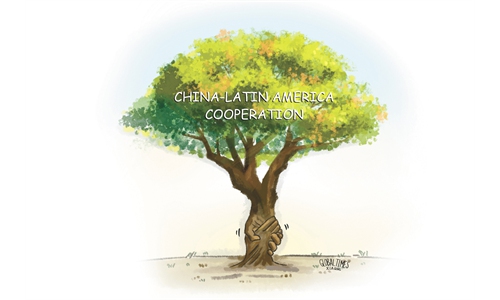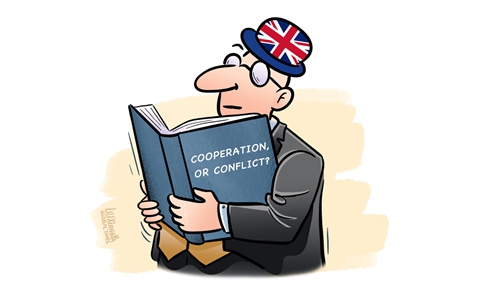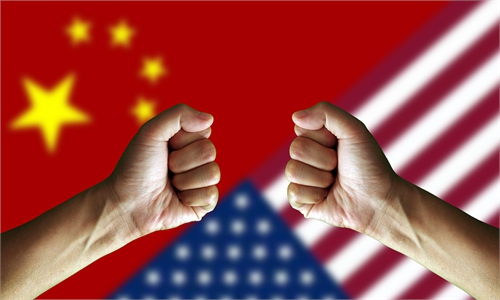
Abandoned factory warehouse in the "Rust Belt" in Ohio, US. Photo: VCG
As Chinese people deepen their understanding of US' internal diversity and complexity, awareness of the "Rust Belt" has also grown. I live and teach in the "Rust Belt," giving me some insight into the region's local customs, social psyche and cultural climate. Understanding the American interior, rather than focusing solely on the major cities on its coasts, is crucial to gaining a deeper understanding of the US.In modern American history, the "Rust Belt" became a pivotal industrial region thanks to its coal resources, oil reserves, steel industry, automobile manufacturing, Great Lakes shipping routes, canals and rail networks connecting its states, and the interstate highways that emerged during World War II. However, the deindustrialization policies, the relocation of industries to other regions, and the rise of the electronics and information sectors led to its decline. By the early 1980s, the region was already facing economic recession, population loss and waning urban prosperity.
This decline was the result of a decades-long economic trend involving industrial upgrading, outsourcing, the reshaping of domestic economic geography, and changes in lifestyle - complex factors far removed from the rhetoric of some US politicians who blame "China for stealing jobs." In fact, when the "Rust Belt" began its decline in the 1980s, China had just launched its reform and opening-up policies, with most early foreign direct investment coming from capital from the Chinese community in Southeast Asia.
What concerns me more, however, is the psychological imbalance and distorted worldview caused by the "Rust Belt's" decline, as well as the underlying cultural issues. Through years of teaching, I've observed that local white American students are far from a homogenous group. Those from coastal metropolitan areas tend to show greater interest in Asian culture and Chinese history, demonstrating more empathy and respect for China and East Asia. Conversely, some students from small towns in the "Rust Belt" often exhibit emotional resistance and aversion to topics related to China, heavily influenced by their families, media reports and local cultural attitudes.
For example, students with negative views of China often share certain traits. In the spring of 2024, one student in my class persistently argued that "China stole our jobs," emphasizing that as a native of Cincinnati, Ohio - a city in the "Rust Belt" - he was a "victim" of China. These students also tend to obsessively emphasize their "fear" and "anxiety" about China.
The negative attitudes of such students often reflect the influence of their families and communities. What I focus on is the tendency among some white Americans in the "Rust Belt" to fixate obsessively on external blame rather than self-improvement, channeling their fears and anxieties toward another country as a form of illusory self-soothing. This reliance on fear, anxiety and external scapegoating to maintain a semblance of psychological balance is abnormal, yet it has become a daily reality for many in the "Rust Belt."
From my years of observation and experience in the US, I've found that a cultural tendency toward a lack of self-reflection obstructs possible introspection. This leads some Americans to alleviate their imagined anxieties and fears by directing hostility outward, including at undocumented immigrants.
In the 1950s, a blue-collar worker could support a family, own a house and a car, and provide a middle-class lifestyle, embodying the "American Dream." Yet this "dream" was a Cold War propaganda construct, too fragile to withstand economic crises, inflation, global economic restructuring or domestic geographic redistribution. The problem lies in the fact that "Rust Belt" residents cling to the "American Dream," fostering a strong dependence on large corporations without recognizing that it is these corporations that abandoned them.
Many disillusioned "Rust Belt" residents turn to alcohol and drugs or focus their fears and anxieties outward, relying on presidential elections to change their fate.
Although the US is the most technologically and militarily powerful country on Earth, many Americans still have strong feelings of "fear" and "anxiety." These irrational feelings can only be understood in the context of spiritual emptiness, intellectual laziness and entrenched cultural flaws. However, due to the aggressive nature and weak self-reflective capacity of American culture, many are trapped in unsolvable psychological dilemmas. They instead turn to state power to bring manufacturing back, expel undocumented immigrants and punish perceived "enemies." Ironically, in doing so, these Americans are steadily losing the cherished spirit of "individualism." Their sense of identity is increasingly blurred, and they are becoming spiritually closed-off, unmotivated and manipulated by politicians and mainstream media - a value system that is subtly shaping their next generation.
The author is an associate professor of history at Allegheny College, US. opinion@globaltimes.com.cn



